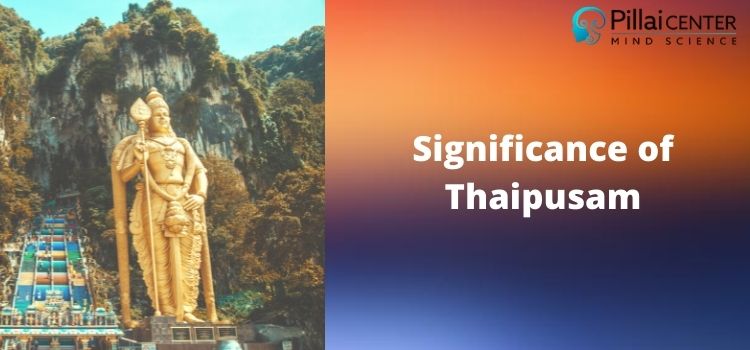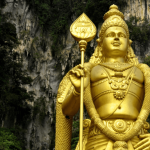Thaipusam festival
Thaipusam is an important festival observed by the Hindus of southern India during the Tamil month of Thai (January – February). Apart from India, the festival is celebrated by the Tamil speaking community living in Malaysia, Singapore, South Africa, Sri Lanka, Australia and other countries of the world.
It occurs on the full moon day in the Tamil month, Thai (January–February). The word “Thaipusam” comes from two words, ‘thai’ which means “10th”, and ‘pusam’ meaning “when the moon is at its brightest. Thaipusam is thus observed every year in the month of Thai (10th month of the Tamil Almanac) on the day when the moon passes through the star “Pusam”.
Thaipusam is dedicated to the worship of Lord Muruga, also known as Subrahmanya, an important South Indian god. He signifies youth, power and virtue.
People offer worship and visit Murugan temples during Thaipusam. During the festival, devotees perform various ritual as a mark of thanks giving to Lord Muruga and as an act of repentance for the faults or sins committed by them.
Connection between Thaipusam and Lord Murugan
Thaipusam is dedicated to the Hindu deity Murgan, the second son of Shiva and Parvati. He is depicted as strong and handsome. Muruga bestows knowledge, power, wealth, health and other virtues to his devotees. He has several names like, Shanmuga, Kartikeya, Subrahmanya, Visagan, Velavan, Skanda, and Guha.
It is believed that on Thaipusam, his mother, Goddess Parvati presented a Vel (Spear) to Murgan to defeat the demon Tarakasura and his army. Thaipusam, like many other Hindu festivals is the celebration of the victory of good over evil.
Along with Skanda Shasti and Vaikashi Visagam, Thai Poosam is a major festival of 0Muruga.
The Legends of Thaipusam
As per the Hindu scripture, “Skanda Purana,” it was on Thaipusam, when Lord Muruga mounted on a peacock, appeared before his devotees.
The festival also celebrates the triumph of Good over the evil forces. Once upon a time, the Devas were experiencing hell due to the asuras, or demons. The Devas surrendered to Lord Siva, to save them. Moved by their pleas, Lord Siva commissioned his son, Muruga, to decimate the Asuras and protect the Devas.
Muruga went for a combat with asuras and he decimated them. After this, Muruga appeared before the devas, in a beautiful form, adorned with shining jewels, holding a golden spear and seated on a royal chariot. To commemorate this, on Thaipusam day, Lord Muruga’s processional idol is adorned and decorated with jewels and is placed on a silver chariot.
The priests offer special worship to the processional deity and after the devotees have darshan it is taken for a procession around the streets of the temple. The devotees who have took special vows and pledge to Lord Muruga, perform them during Thaipusam. They prove their gratitude to the God by undergoing self-mortification on Thaipusam day.
How is Thaipusam observed
A most popular way of expressing gratitude to Muruga during Thaipusam is by carrying of the “kavadi”. The word Kavadi means “sacrifice at every step”, kavadi is the main feature of the Thaipusam festival.
Legend states that Iduban, a great devotee of Lord Subramania, was the first one to carry a structure similar to the Kavadi. He tied two heavy boulders and balanced it on his shoulders and carried to the Murugan temple atop the hill as a token of seeking forgiveness. Idumban’s act pleased Muruga so much that he bestowed abundant blessings and prosperity on him and his people. The burden carried by Iduban has transformed to the form of the kavadi.
Kavadi is a steel or D-shaped wooden frame attached with bars to provide support for the shoulders. Devotees decorate kavadis with flowers and peacock feathers. The other forms of Thai poosam sacrifice are piercing silver pins or lance through the cheek and tongue and pricking the body with hooks and spear-like needles.
The devotees performing the sacrifice the Thaipusam rituals have to observe strict physical and mental discipline. Throughout the month of Thai, they have to follow the rituals that purify the body and mind. This includes taking just one vegetarian meal a day, and sexual abstinence. In addition, they observe a 24-hour fast on the eve of Thaipusam.
While the male devotees usually perform the rituals like kavadi and piercings. The women devotees carry a pot of milk called a palkuddam for the deity. The pot of milk is used to perform Abishekam (hydration ceremony) to Lord Muruga’s statue at the temple. The female devotees also pierce small vels in their tongues.
Thaipusam 2022
In 2022, Thaipusam falls on 18 January, 2022 (Tuesday). Each and every Murugan temple in India and abroad will be abuzz with spiritual activities.
Thaipusam is celebrated with great pomp at Palani Dhandayudhapani temple. Every year a 10-day Brahmotsavam festival will be held during ThaiPusam. Several devotees will undertake Paada Yatra (travel by foot) to Palani, wearing saffron or green clothes. They will take Kavadi, carry Paal Kudam (Milk pot), Pierce Spear (Alagu Kuthuthal), Tonsure their Head (Put Mottai), and do Angapradakshinam to the deity.
« How Full Moons Can Attract Abundance Importance of Shasti Vratam on Shashti Days »


